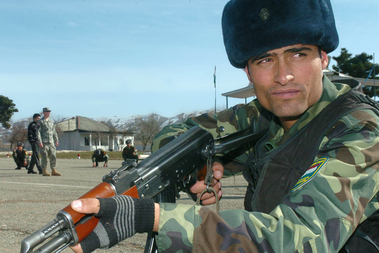U.S. government records show that the United States has stepped up its trainings of elite military units in Tajikistan, Uzbekistan, Kazakhstan, and Azerbaijan over the last two years, according to EurasiaNet.org. At the same time, the U.S. has reportedly suspended training of units from Kyrgyzstan, previously one of the biggest recipients of such aid.
The aid comes under Section 1004 of the National Defense Authorization Act, which allows the U.S. Department of Defense to train and equip foreign security forces involved in counternarcotics and transnational organized-crime missions. This training is conducted by U.S. special forces troops, usually for other special forces troops, and tends not to be made public except in annual State Department reports.
In total, U.S. special forces conducted training exercises for 1,153 troops from the Caucasus and Central Asia in fiscal year 2015, according to the most recent report (the U.S. fiscal year starts October 1 of the previous calendar year). The most recent data shows that in fiscal year 2016, the U.S. planned to carry out slightly more trainings, of 1,157 soldiers. Both would be record highs for the region, up from 1,141 in 2013 and 841 in 2012, according to data from Security Assistance Monitor, a Washington, D.C.-based group analyzing foreign military aid.
The 2015 figures represent trainings that were conducted, while the 2016 figures represent planned trainings. It was not clear whether the planned 2016 trainings were actually carried out. U.S. Central Command, which administers the training exercises, did not respond to requests for comment.
Over the last two years, Tajikistan has been the single largest beneficiary of this training, with a total of 886 troops trained in fiscal year 2015 and 340 planned to be trained in fiscal year 2016.
In Tajikistan, U.S. Army special forces detachments trained units from the National Guard and a unit identified in the documents as “MGSO.” The courses offered in 2015 were mostly three months long, while some were six weeks.
In Uzbekistan, 267 soldiers from two special forces units were trained by U.S. Army special forces in 2015. The U.S. was planning to train the same number of soldiers from the same units in 2016.
In Kazakhstan, the U.S. was planning to carry out three trainings of a total of 450 troops in 2016. Two of the trainings were to be conducted by U.S. Army special forces, and the third by U.S. Navy special forces. Kazakhstan has only gotten a Section 1004 training once before, with 125 troops trained in 2012.
Prior to 2015, Kyrgyzstan had been the top recipient of Section 1004 training, with more than 1,000 members of various units taking part, including the Alphas and Borus from the State Committee on National Security (GKNB) and the Scorpions, Panthers, and Ilbirs from the Ministry of Defense. Most of that training was conducted while the U.S. and Kyrgyzstan were conducting negotiations over the fate of the Manas air base just outside Bishkek. That base closed in 2013, though, and since then the U.S. has not trained any of Kyrgyzstan’s special forces, the U.S. documents show.
The increase in special forces training is consistent with U.S. policy trends around the globe: worldwide, aid under Section 1004 has increased from $501 million in fiscal year 2011 to $957 million in 2015.
The fate of these aid programs under the administration of President Trump is unclear. Trump has promised to slash foreign aid, but also a tougher fight against Islamist terror groups, which governments in Central Asia tend to use as a justification for the need for military aid.
U.S. Army General Joseph Votel, commander of CENTCOM, delivered his annual posture statement to Congress on March 9, and he suggested the prospects for security cooperation were, if anything, increasing.
“Tajikistan’s long border with Afghanistan remains the nation’s top concern, as the Taliban intermittently fights for control of Afghanistan’s Kunduz province, which is less than 160 miles from Dushanbe,” he said. “These border concerns remain a focus area for U.S. security cooperation as we continue to develop the Tajiks’ capacity to address violent extremism, terrorism, and narco-trafficking; enhance border security; and, confront other trans-regional threats.”
Votel said he was cautiously optimistic about the opportunities for the U.S. in Uzbekistan with the accession to power of President Shavkat Mirziyoyev.
Kyrgyzstan is “Central Asia’s sole democracy,” but also “sees political pressure from its larger, more powerful neighbors, including Russia,” the CENTCOM statement says. It suggests that military aid could resume: “After a lengthy period of time during which few bilateral activities occurred, the Kyrgyz military may be increasingly receptive to higher level military engagements and expanded cooperation in the areas of border security, counter-narcotics, counter-terrorism, and countering violent extremism.”




